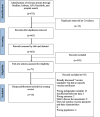The barriers, facilitators and association of vaccine certificates on COVID-19 vaccine uptake: a scoping review
- PMID: 37759306
- PMCID: PMC10537206
- DOI: 10.1186/s12992-023-00969-y
The barriers, facilitators and association of vaccine certificates on COVID-19 vaccine uptake: a scoping review
Abstract
Background: Globally, COVID-19 vaccines have proven to be instrumental for promoting population health by reducing illness from SARS-CoV-2. Vaccine certificates emerged as a potentially promising solution for encouraging vaccination and facilitating the safe reopening of society, however, they were controversial due to criticisms of infringing upon individual rights. While there is extensive literature describing the ethical, legal, and public health implications of vaccine certificates, there is currently a gap in knowledge about the association of vaccine certificates on vaccine uptake during the COVID-19 pandemic and barriers and facilitators to their use.
Objectives: The objectives of this scoping review are to (i) describe the existing literature on the association of vaccine certificates on the rates of COVID-19 vaccine uptake across several countries and (ii) describe the intrinsic and extrinsic barriers or facilitators that moderate this relationship.
Methods: We conducted a scoping review based on PRISMA Extension for Scoping Reviews (PRSIMA-ScR) guidelines. We searched three bibliographic databases (APA PsychInfo, Embase Classic + Embase, OVID-Medline) and preprint severs during the first week of July 2023. Three reviewers independently screened the studies based on pre-specified eligibility criteria and performed quality assessments of the primary literature and data extraction.
Results: Sixteen studies met the inclusion criteria. 14 or these were surveys and 2 were modelling studies. The majority documented that vaccine certificates were significantly associated with increased rates of COVID-19 vaccine uptake (n = 12), motivated by factors such as travel/employer requirements, influence from the government/peers, and trust in the safety, efficacy, and science behind COVID-19 vaccines. Three studies had non-significant or mixed findings. Only one study found a significant decrease in COVID-19 vaccine uptake, motivated by pervasive distrust in the QR code-based system of digital vaccine certificates in Russia. Quality of survey studies was generally high.
Conclusion: Our findings provide insights into the existing literature on vaccine certificates association with vaccine uptake in several different jurisdictions and barriers and facilitators to their uptake. This information can be used to guide future examinations of the implementation of vaccine certificates and more effective implementations.
Keywords: Barriers; COVID-19 vaccines; Facilitators; Vaccine certificates.
© 2023. BioMed Central Ltd., part of Springer Nature.
Conflict of interest statement
KW is the co-founder and Chief Scientific Officer of CANImmunize Inc. KW also serves on the vaccine safety advisory boards for Medicago and Moderna.
References
Publication types
MeSH terms
Substances
Grants and funding
LinkOut - more resources
Full Text Sources
Medical
Miscellaneous


